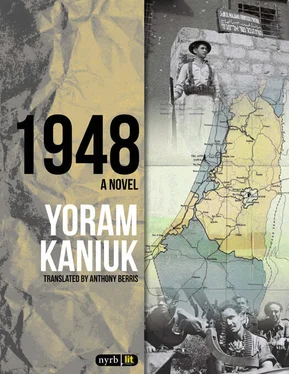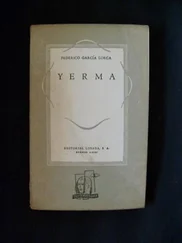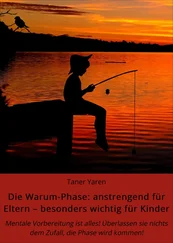In the cemetery at Kiryat Anavim, where I thought Yitzhak Rabin would be buried beside his dead soldiers and comrades, where my comrades rest, Menachem the friend of my youth and others, today there is no headstone bearing the name Rabin, but there isn’t one bearing the name Yashka the Partisan either. I could have inquired at the kibbutz whether they’d forgotten or perhaps they’d learned his real name and found relatives who’d taken his body, and perhaps he’d been buried someplace else under his full name or transferred to another cemetery or that the pit was full and they didn’t see and he disappeared. It says in Psalms 6, “For in death there is no remembrance of Thee; in the netherworld who will give Thee thanks?”
Yashka the Partisan was a Jew even if perhaps he wasn’t. If his dead body had been transferred elsewhere or the rabbinate had discovered his grave and checked if his mother was Jewish, and perhaps she’d tried to have him circumcised postmortem, he remained where he was buried even if they’d moved him. In an eternal heaven absent of God there is Yashka the Partisan, whatever his name might have been.
A few months earlier at Kibbutz Sdot Yam, a short time after the girl from Lehi disappeared, we were told we were going to take Caesarea, which was sunken in the sand with only the minaret of the mosque and the jetty protruding from it. The jetty was supported by light-colored marble columns that Lady Hester Stanhope — of whom it was said that she thought Palestine an erotic country — had brought from Ashkelon in the previous century. When I was a boy my father would take me to visit the Bosnian who’d established a small museum on the jetty at Caesarea. He’d send a car to pick us up from the main road. A sweet roly-poly man with a childlike smile, who had lots of coins, icons, and jars. We’d sit with him on the jetty facing the sea and he’d bring out two nargilehs, a boy would fill them with coals and spread the ash and light them, and the man and my father would smoke and talk in German about their student days in Heidelberg.
Now we’d been told we were going to take Caesarea because an illegal immigrant ship was due, and the Arabs would make trouble. I said that they’re not Arabs but Bosnians. They said, An Arab’s an Arab even if he’s a Basunian. Bosnian, I said. Whatever, they replied. They said that there mustn’t be a lot of Arabs there who’d make trouble, and what the hell are Bosnians? They’re all Arabs. One of us was sent to observe the town and draw a map and first thing the next morning we went out. It was dark. We went in two boats, the Dov and the Tirzah . We rowed out, not under sail, with six oarsmen on each side. We had two rifles, one that fired and another that was taken from the cache and cleaned. We reached the edge of the bay. Ari-nom-de-plume and Haim-and-a-half fired, one rifle worked, the other didn’t. They tried the other one again and the cartridge, that had sand stuck to it, got jammed in the barrel, and the barrel bent and a miserable bullet was ejected and hung in the air, and immediately afterward fell, looking like a drop of an old man’s sperm.
We landed on the beach and saw the Bosnians escaping. They walked slowly. They didn’t appear to be frightened or retreating. They walked in majesty. They carried their belongings with a kind of proper pride. Mishka banged on a can so there’d be more noise, and a Haganah Primus aircraft passed slowly overhead, lost altitude, and tried to drop a bomb, but the bomb exploded in the air and its pieces fell into the dunes. The Primus was buffeted by the blast and climbed like some Yiddisher cowboy. The Bosnians were deep in the dunes and I saw how they were still walking calmly. Perhaps their sadness was in their walk, which I didn’t understand then but do today. I asked Ari-nom-de-plume who they were bothering and he said, They’re bothering my ass, we’ve just got to make sure there aren’t any Arabs here and that’s why we’re expelling them. I went to the museum, from where my father’s friend had managed to rescue some of the rarer antiquities and take them with him, and Ari-nom-de-plume came up behind me and tried to go inside. I stopped him and asked him not to take anything. He shoved me with compassionate friendliness and went inside for a moment, I ran after him, he evaded me and went outside, raised his hands, and said, Look, they’re clean!
We sat and smoked until an officer came and yelled, Caesarea is in our hands! — as if we’d beaten Herod and the Romans and the Germans as well. He sounded excited. I said to him, What’s this “in our hands”? What kind of “in our hands” is it? And somebody told him, You’re a man’s man! Kifaq hey ! — Bravo! In the distance we could still see the column of refugees. They were wearing coats and hats and looked like ants chewing sand. At the tail of the column I saw a little girl wearing a green coat and clutching a doll. She was looking back and being dragged along by an Arab I identified as my father’s Bosnian friend, and I was saddened but didn’t do anything. What I saw didn’t yet have a name or a title. The man was a tiny movement in a landscape. There was also something aesthetic in that vast painting of the ruins of ancient walls, Greek marble columns, a mosque minaret half sunken in the heap of sand in front of it, and the human column.
(Years later I was in the United States at a party marking the publication of my book about a man whose mother was Jewish and father was Arab, and the struggle of the Arab in him against the Jew in him, and there was a woman there who came over to talk to me. She said her name was Inaya and introduced her husband, and said with a kind of nice straightforward contrariness that he’s a Jew. She was tall and good-looking and said she’d written a good review of the book and that she is a Palestinian. Where from? I asked, and she replied, Caesarea. She told how, when she was five years old, the Jews had come with warships and cannons, and there was a battle and the Jews took Caesarea with great force. I looked at the little girl with the coat and the doll, and didn’t tell her about the two rifles, one of which fired and the other that didn’t. She was so nice to me. Her husband told me a joke about a Jew, a Frenchman, and an Englishman, and I thought, Fifty years earlier that little girl was but a Bosnian speck in space.)
At Caesarea, on the day of the great conquest, which if I’m not mistaken was the first conquest of a village in the War of Independence, British police boats were seen searching for something, and Ari-nom-de-plume was sitting next to me and trying to press me into going into the museum again, which I’d been appointed to guard. An officer came out of the dunes in a jeep, a pistol on his belt, and put a padlock on the door. And five guys from Kibbutz Ma’agan Michael with a pistol and unarmed combat sticks came, and we left in boats for Sdot Yam. In the evening the commanding officer spoke about how we were fighting a war of no choice and how everything was as it should be. I said I don’t understand why we had to take Caesarea, which hadn’t fought against us, and the guy said that an illegal immigrant ship had been due to arrive and the villagers posed danger. I wondered where it was, and he said they’d probably spotted the British in the boats and set course for another beach.
Before supper we were called in by the CO. He said that money and gold had been stolen from the museum and that he knew who the thief was, and added that we were leaving the camp area for an hour, and someone, whoever it was (and I of course knew who but I’m fair and compassionate and I’m giving him a chance) will put the money in the girl from Lehi’s empty tent. We left. The CO came back an hour later and found the money and gold and didn’t say a word. Only he and me and Ari-nom-de-plume knew who the thief was.
Читать дальше












